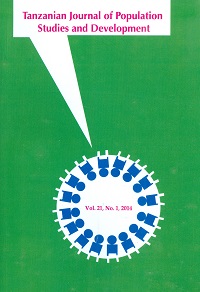Socio-economic and Demographic Determinants of Food Security in Chamwino District, Tanzania
Abstract
The general causes of food insecurity in Tanzania include use of a low level of technology, dependency on rainfall and lack of proper inputs. While these factors are fairly well known, the socio-economic and demographic determinants of food security status in Chamwino District are not known empirically. In this paper: (1) socio-economic and demographic characteristics of surveyed households are analysed and (2) the impact of socio-economic and demographic characteristics on food security is determined. A cross-sectional research design was used to collect data from 400 households which were randomly selected. Based on multiple linear regression, four socio-economic and demographic variables (household size, land size cultivated, total annual household income per adult equivalent and age of household head) significantly (p < 0.05) positively influenced food security. It is concluded that socioeconomic and demographic factors greatly affect food security in the study area and that addressing these factors could improve food security. It is recommended that public and private institutions should be more involved in addressing the food insecurity problem in Chamwino District by focusing on the demographic and socio-economic factors which reduce food security.
Keywords: Demographic and socio-economic factors, food security, determinants of food security



